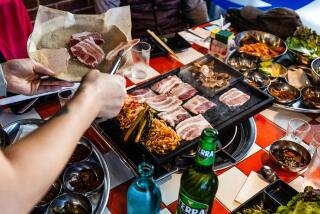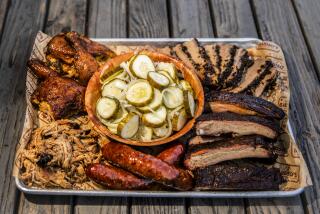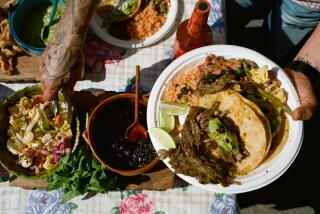Taste of the season: smoke and onion
- Share via
IT’S dull and overcast, a gray world. The freeway’s gone comatose, as if nobody’s sure why they’re even out on the road today. Everything’s slow and muffled. This is as close as you ever feel to hibernating.
And then, as you pull into your friends’ driveway, the cheery smell of smoke and browning meat eddies around from the backyard, and eternal summer breaks through. Out there, it’s a party -- everybody’s grilling meaty ribs or monster steaks or a juicy pork roast or piles of big, thick burgers! Winter fades away. The world makes sense again.
Barbecuing in winter. Sure. Your real Angeleno keeps on barbecuing straight through February. I have personally been known to grill in light rain, and a cousin of mine claims to have done it in that snow stuff they have up at Mammoth Mountain.
“Of course I barbecue in winter,” says longtime L.A. studio musician Kent Housman. “What else is there to do?”
Woolf Kanter of Pacific Palisades agrees: “There’s absolutely no reason to stop, even if it’s raining. It’s barbecue, right? Especially if you have a smoker -- then you’re really covered. Smoked barbecue is better in winter than in summer, it’s comfort food.”
Exactly. Why stop at all? Barbecuing is our birthright. Our supermarkets don’t stop selling charcoal just because it’s January. Around here, nothing really keeps us from treating the whole year as one long barbecue season.
And so we do. My cousin recently put in an expensive range at his house, but he keeps working on his rib-barbecuing technique month in and month out.
It can get nippy out there, but that’s not such a bad thing. January weather is as close as we have to those brisk autumn days people glory in back East. On a gray afternoon, barbecuing becomes a private, meditative, poetical sort of thing, kind of like hiking back to town for a gallon of gas.
Granted, once in a while you will experience wetness coming out of the sky. My advice: Wear a broad-brimmed hat, such as a cowboy hat; works about as well as an umbrella and leaves your hands free for business.
Plus you don’t look so silly. Barbecuing with an umbrella in one hand is kind of Mary Poppins-ish. (Anyway, it’s totally incompatible with sipping beer, an inalienable perk of working the grill.) I also recommend wearing the sort of artificial-fiber zip-up jacket that dries out fast.
You can barbecue all the same things you do in summer, but you may feel the urge to cook seasonally. The main difference between summer and winter barbecue is that the winter variety tends to be more substantial. Say, really thick steaks, or a pork roast instead of pork chops.
Or something oniony. I happen to believe that when the weather gets a little chilly, you need Big Mr. Onion on your side. And the best way to have that is to use the onion’s aromatic soul -- its fresh juice -- freed from the husk of its flesh.
Yes, making onion juice will make your eyes smart (do it near a fan, if it really bothers you). But the juice contains the only valuable part of the onion, its volatile perfume.
No kidding, the only valuable part of the onion. Sure, raw onions are OK in salads and sandwiches and fried onions are luscious. But the onion solids, by themselves, have nothing to offer but a commonplace bittersweet taste and a coarse vegetal odor.
For a winter lunch, onion burgers made with onion juice seem ideal to me. The sweet scent of onion permeates the meat, giving you a warm breath of encouragement in every bite. You could put plain mustard on them, but the weather calls for a richer sauce: sour cream stirred with Dijon mustard. It goes beautifully with onion-scented beef.
In summer, I’m all for giving hamburgers a nice smoky flavor and putting them in the classic burger bun, but these babies work best when you go easy on the smoke and serve them on toasted crusty bread, along with a simple salad. Once I found some really ripe hothouse tomatoes in the market, sliced them up and topped them with mayonnaise.
If you want to grill something more substantial, it’s hard to beat a pork loin roast. Brine it overnight so it will be more juicy, and baste it with onion juice (of course). If you were roasting it in the oven, you’d have juices for making gravy, but that’s not an option here. I like a simplified version of the pomegranate, herb and garlic sauces they make in Armenia and Georgia: just a jolt of sweet-sour flavor and bright fragrance.
To accompany the roast, throw some carrots on the grill; parsnips too, if you want to go two-tone. And cook them until they’re good and limp -- this is no season for the crunchy, light-’n’-fresh grilled veggies that people make in summer. You want them thoroughly cooked, sweet and comforting -- and fragrant, like all this winter barbecue.
Nor is it any time for light lagers or mild Merlots. It’s not beach weather -- you’re not drinking just because you’re thirsty. This is the season for strong, thoughtful, slow-sipping beers that will stand with you: bocks, stouts and Belgian trippels, or India pale ale, if you’re in the mood for a bracing dose of hops.
As for those who don’t want to stand out in the patio tending a barbecue in all weathers, I want to emphasize that they have a valuable contribution to make too. Somebody has to stay in the comfort of the kitchen and make mashed potatoes for us all.
Just don’t look at me. I’m busy out here nursing these coals, doing my bit to keep the gray world away.
*
**
January barbecue onion burgers
Total time: 30 minutes
Servings: 8
Note: Panko is available at Asian markets, well-stocked supermarkets and Trader Joe’s. Or you may substitute two English muffins; grind them to coarse crumbs in a food processor, then dry the crumbs in a microwave or skillet.
1 large onion
1 cup panko
2 pounds ground beef (15% fat)
1 teaspoon salt
1/2 teaspoon freshly ground black pepper
1/2 cup sour cream
1 tablespoon Dijon mustard
8 thick slices toast (such as
baguette)
1. Puree the onion in a blender. Squeeze the onion juice through a fine strainer or double layers of cheesecloth and discard the solids. You should have about one-half cup of onion juice. Mix the juice with the crumbs, allow to sit 2 to 3 minutes and then squeeze out excess juice.
2. Place the crumbs, beef, salt and pepper in a food processor and process until it forms a ball on top of the blade, or knead thoroughly by hand. Form the meat into eight patties.
3. Grill the patties until medium rare, about 5 minutes per side. While grilling, mix the sour cream and mustard together. Serve the patties on the toast and top with 1 tablespoon of the sour cream-mustard sauce.
Each serving: 457 calories; 27 grams protein; 35 grams carbohydrates; 2 grams fiber; 22 grams fat; 9 grams saturated fat; 83 mg. cholesterol; 766 mg. sodium.
**
Winter roast pork with basil pomegranate sauce
Total time: About 2 hours, plus 12 to 14 hours brining time
Servings: 10 to 12
Note: Pomegranate molasses is available at Middle Eastern markets, Whole Foods stores and Surfas in Culver City. Use a 2 1/2 -gallon or larger sealable plastic bag for brining.
Basil pomegranate sauce
1/2 cup pomegranate molasses
1 clove garlic, crushed
2 tablespoons minced fresh basil
Salt
Put the pomegranate molasses, one-fourth cup water, garlic and basil in a saucepan. Bring to a boil, then reduce the heat to low and simmer 5 minutes. Salt to taste. This can be made ahead of time and reheated for serving. Strain into a gravy boat.
Pork loin roast
2/3 cup kosher salt
2 tablespoons sugar
4- to 5-pound tied boneless pork loin roast
1 onion
4 large carrots
2 tablespoons olive oil
Salt and pepper
Basil pomegranate sauce
1. To brine the roast, dissolve the salt and sugar in 1 gallon of water in a large bowl. Place the pork loin in a large plastic sealable (brining) bag, pour in the liquid and seal. Marinate for 12 to 14 hours in the refrigerator.
2. Cut the onion in eight pieces and puree in a food processor. Place the onion in a fine strainer or double layers of cheesecloth, press out the onion juice and discard the solids. Set the juice aside (to use for basting).
3. Remove the meat from the brine and pat dry. Allow to stand at room temperature for up to 30 minutes. Heat the grill. On a gas grill, heat up half the grill, as the meat should cook over indirect heat. For a charcoal grill, arrange hot coals to either side of the grill. When the grill is hot (400 degrees), oil the rack and place meat onto the rack, not directly above the heat. Cover the grill and cook until an instant-read thermometer reads 137 to 140 degrees, about 20 minutes per pound. (The temperature will rise about 10 degrees, to medium, after it’s removed from heat.) Baste with onion juice every 15 minutes. If the outer part of the roast is done before the center comes to temperature, tent with foil to prevent from drying out.
4. Peel the carrots and cut them on the bias in large chunks (about 3 inches). Toss with 2 tablespoons olive oil and salt and pepper to taste. About an hour after the roast has been put on the grill, put the carrots on the grill around the roast.
5. When the meat is done, remove it to a serving dish, cover with foil and let rest 10 minutes. Serve with the carrots and warm pomegranate sauce.
Each of 12 servings: 300 calories; 33 grams protein; 8 grams carbohydrates; 1 gram fiber; 13 grams fat; 4 grams saturated fat; 95 mg. cholesterol; 396 mg. sodium.
More to Read
Eat your way across L.A.
Get our weekly Tasting Notes newsletter for reviews, news and more.
You may occasionally receive promotional content from the Los Angeles Times.










